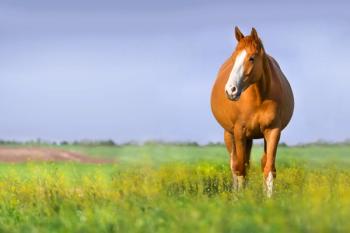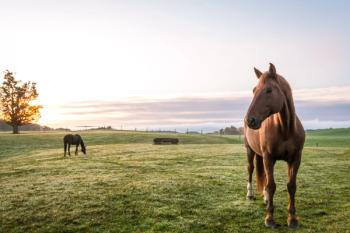
Proposed horse-slaughter plant in N. Dakota draws support
Bismarck, N.D. - Veterinarians, ranchers and horse breeders packed the state's House Agriculture Committee meeting to urge passage of a bill to study the feasibility of building a horse meat-processing plant.
Bismarck, N.D. — Veterinarians, ranchers and horse breeders packed a state House Agriculture Committee meeting to urge passage of a bill that would earmark $75,000 for a study to determine the feasibility and legality of building a horse meat-processing plant in North Dakota.
The nation's last three horse slaughterhouses were shut down in 2007, but the study requested by North Dakota State Rep. Rod Froelich, a Democrat, and State Sen. Joe Miller, a Republican, would authorize the state's Department of Commerce to spend up to $75,000 examining building costs of a privately run processing plant, possible markets the plant could sell to and any potential conflicts with federal regulations.
Among those speaking at the Feb. 6 committee session was Gerald Kitto, DVM, a mixed-animal practitioner for 34 years who operates Sheridan Animal Hospital in McClusky, N.D., about 65 miles north of Bismarck.
"I've had more requests to euthanize unwanted horses, lame or otherwise, the last couple of years. People just don't have anyplace to take them," Kitto tells DVM Newsmagazine.
"Those at the meeting were overwhelmingly in support of this bill. There are economic reasons for it. Breeders, for example, have customers who want to buy a horse but have a lame one to get rid of. It's become a big economic problem. But as a veterinarian, I look at it from the standpoint of the horse's welfare," Kitto says. "Since people can't take horses to slaughter, there's more abandonment, more cruelty. I've seen horses that starved to death. And up here in this climate, with two feet of snow on the ground and extreme cold, it's even worse. No one can tell me it's more humane to prevent them from going to a properly run slaughter facility. I think veterinarians have seen only the tip of the iceberg so far in dealing with this problem."
During his testimony, Kitto held up a picture of a horse that had starved to death in a field. Even though some advocate humane euthanasia, Kitto points out that most people have no idea how to euthanize a horse correctly and humanely. "Most don't know how or where to shoot, so they bring them to me." He told legislators euthanasia and disposal of horses can be quite costly for owners.
About 100,000 horses a year were slaughtered in the United States, with meat exported for human consumption in Europe and Asia, before the last three facilities — two in Texas and one in Illinois — were closed in 2007 through action in those states. Since then, many horses have been shipped to processing plants in Mexico and Canada.
National legislation to ban horse slaughter for human consumption was introduced in Congress several times in recent years but stalled each time. The new Congress is expected to take up the issue again this year in legislation that might not only ban slaughter, but also prohibit shipping horses outside the country for slaughter.
Despite that prospect, the problem is serious enough that Rep. Froelich, whose family owns a horse ranch, feels the state should at least study the feasibility of building a slaughter plant. Other states, including Montana, are considering similar legislation, he says.
Even if the new Congress passes legislation to ban slaughter, there are Indian tribes in North Dakota that might decide to build one outside federal jurisdiction, Kitto says.
Miller says he and Froelich decided to sponsor the bill because many constituents urged them to do so.
Otherwise, "we're going to get to a point where horses will be running around like deer. That's something we need to control," Miller told reporters recently.
The two North Dakota legislators say their bill represents one state's solution for the unwanted horse "epidemic" that is growing nationwide.
Newsletter
From exam room tips to practice management insights, get trusted veterinary news delivered straight to your inbox—subscribe to dvm360.




